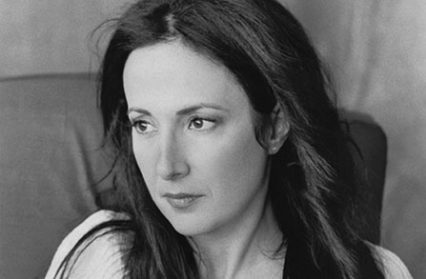Ahead of the release of her latest poetry collection, God Loves You, Kathryn Maris chats to Wales Arts Review’s Carl Griffin about her craft and inspirations.
The title of your new collection, God Loves You, reminds me of the poem ‘The God Who Loves You’, by Carl Dennis, in which the directions our lives take are questioned, as is our reactions to them. How much of this appears in your collection, and where else does the book take us?
Kathryn Maris: As much as I admire Carl Dennis’s poem ‘The God Who Loves You’, I could never write that poem or anything like it. The only aspect of his poem that applies to my book (besides the coincidentally similar title) is that he imagines a God figure that ultimately becomes a rhetorical device.
The similarity in titles weakens my question a little but how does one collection of poems about God, or some kind of afterlife, written by a non-believer, differ from another?
Kathryn Maris: I find it interesting that you’ve concluded we are both non-believers. When Carl Dennis won the Pulitzer, he said in an interview that he does not have an interest in theology and tends towards ‘secular stances.’ But as for me: my Greek Orthodox upbringing is an important reason for my interest in ‘God’ and religious subjects. While it’s true that much of the music in the book is borrowed from the King James Bible — which interests me as ‘literature’ — some of the music in my poems has its antecedents in Greek Orthodox liturgical chanting.
And aesthetically our work is very different. Carl Dennis is one of several what I might call ‘plain-speaking’, mostly male, mainly American poets not precisely of the same generation but within a reasonable range of each other that I read quite a lot of in the1990s when I was a student. Some of the others included Robert Pinsky, Charles Simic, Philip Levine, Donald Hall, and Lloyd Schwartz. They are chaotically grouped together in my head because I feel they share some common traits to do with register, high-level syntax, tonal constraint, and an unpretentious, sometimes ironic and occasionally almost ‘homespun’ philosophising as in the Carl Dennis poem you mention.
Though very different to each other, these poets were even more different to the other poets I was reading. Their philosophising was distinct from the surreal meditations you’d find in Wallace Stevens; their penchant for an understated tone felt distinct from hyper lyricists like Louise Glück, Deborah Digges or Sylvia Plath; their sometimes ‘jokey’ humour (especially in Pinsky and Schwartz) felt distinct from the eccentric, almost ingenuous humour of the New York School. They seemed to be writing a kind of poetry that was current and revered – the kind of poetry The New Yorker published – whose traits could be seen in a younger generation of (again) mostly male American poets, including Mark Doty, Tom Sleigh and Tony Hoagland, whose work, like their predecessors’, engaged me then as it does now. But what I do is very different.
I’m a Christian, not one who gets offended for the sake of it, but will I be offended by the poems in this book?
Kathryn Maris: I doubt you will be offended. Maybe because I’m American, I view Christianity as a spectrum. On one end of the spectrum you have Harvard-educated WASPs who attend Episcopal services on the Upper East Side of Manhattan; on the other you have citizens of the Bible Belt who believe the world was created in 7 days and that homosexuality is evil.
But still, you have your own Lord’s Prayer…
Kathryn Maris: But that’s because the Lord’s Prayer — both the Greek version and the English version — is burned into my brain. Poets absorb music, and I absorbed the music of prayers. Yes: it’s possible that this book, with its ironic cover image and flashes of irreverence, might offend people on the reactionary end of the spectrum, but — let’s face it — those people are unlikely to be regular readers of contemporary poetry. I do sometimes wonder how an Orthodox Jew might feel about the casual use of the word ‘God’ spelled out repeatedly in full. But to be honest, this book is more likely to offend other poets, depending on what is anathema to them personally: poets who hate forms; poets who hate the use of the word ‘I’; poets who hate anything that happened more than 5 minutes ago, including the Bible. But even in those matters I tried not to be complacent: I tried to find new ways to use form, new ways to use ‘I’, and new ways to use the Bible.
You quote the writer and physicist Frank Close: ‘If the Creation had been perfect, and its symmetry had remained unblemished, nothing that we now know would ever have been.’ This is an incredible thought. What impact has Frank Close had on your poetry?
Kathryn Maris: I was paired with Frank Close for the Gulbenkian Foundation’s space anthology Dark Matter. The idea was to get poets and scientists collaborating on poems. Frank Close directly inspired two of the poems in my collection: ‘Legacy’, which responded to a passage in his book about the Higgs Boson (Lucifer’s Legacy: The Meaning of Asymmetry); and ‘Why’, which grew out of a paradoxical idea he put forth in an unpublished essay that the universe may have formed itself out of the future. Each interaction with Frank Close sparked my imagination in new, indirect ways, as did each of his books. He has a knack for phrases that stay in the mind, such as the one you quoted above.
Kathryn Maris will be reading in Swansea, at the Dylan Thomas Centre, on May 30th 2013.












